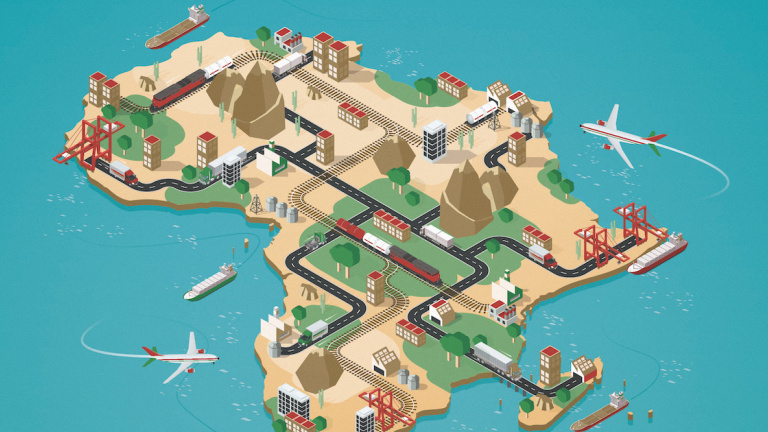
Anchoring intercontinental partnerships between Africa and Europe
There are sound arguments for strengthened EU-Africa partnerships. Making such partnerships work will require a patient approach by the EU, as well as engagement at national and regional levels.
The European Union’s new Strategy ‘with’ Africa proposes a strategic alliance based on strengthened intercontinental partnerships in various areas. How can these intercontinental partnerships be anchored? The answer to this question depends on what we mean by ‘intercontinental partnerships’ and whether they require firm legal counterparts in Africa akin to the European Union (EU).
Must there be a binding agreement and institutional oversight for each of the proposed partnerships, or will political declarations and ‘action plans’ suffice? Who will be the parties to such agreements and what responsibilities will they share?
There are sound arguments behind the EU’s drive to put its relationship with Africa on a new footing and to expand the scope of its relations with Africa into strengthened intercontinental partnerships. The big challenge will be to sell the new message of joint ownership and to make these partnerships work. Previous efforts have achieved only partial success. The Cotonou Partnership Agreement expires this year, and the Economic Partnership Agreements (EPAs) never really got off the ground. Only the SADC-EU EPA is operational, and it is limited to trade in goods. What will guarantee different outcomes this time around? Are there new opportunities and better prospects for intercontinental partnerships now?
One new development is the African Continental Free Trade Area (AfCFTA), which was mentioned during the visit by the new European Commission President to Addis Ababa at the end of February. The fact that the AfCFTA Agreement has entered into force is seen by many as proof of the fact that a continental African regime for trade and economic integration now exists. The AfCFTA is also expected to serve as a platform for Africa to engage with the outside world. This is a premature appraisal. The AfCFTA is not finalised and critical aspects are still being negotiated. The outstanding issues (tariff schedules, rules of origin and trade in services in priority areas) are essential features of a free trade agreement (FTA).
The AfCFTA will not have supra-national institutions to monitor and ensure compliance. The AfCFTA’s institutions, except for the Secretariat, are political platforms representing the State Parties. They will want the AfCFTA to be a vehicle for advancing domestic and regional agendas too. Nigeria has not ratified the AfCFTA, and since October 2019 its borders have been closed to trade in goods. The official explanation is that smuggling must be stamped out.

The extent of future intra-African trade liberalisation can only be judged once the outstanding Phase I negotiations have been completed. Phase II will add additional building blocks in relation to investment (to finance industrialisation and infrastructural development), competition and intellectual property rights. On integration there will not be far-reaching new developments.
The EU’s new Africa strategy covers a broad canvas and some of the proposals are not entirely new. Different implementation strategies will be required. It is proposed that the EU partners with Africa for action in ten different areas. These include: A green transition in full compliance with the Paris Agreement; boosting the continent’s digital transformation; promoting investment; rapidly enhancing learning, knowledge and skills; peace and security; good governance, human rights and the rules of law; migration and mobility; and the strengthening of the international rules-based order and the multilateral system. This is a very ambitious agenda.
How do African nations see these developments? Are they prepared to move beyond ‘development assistance’ and become active partners in joint efforts to tackle global problems, while advancing domestic development agendas? How will they respond to the latest EU proposals.
Is it realistic to expect that there will be one African view on such important matters?
African nations have individual needs, policies and historical ties. Kenya is, for example, on the verge of concluding an FTA with the United States. Others will not do so; they prefer deals with China, with which they are more comfortable.
The design of the AfCFTA displays an important feature, which will have consequences for the EU’s plans for intercontinental partnerships: it does not suspend existing realities when it comes to African regional integration arrangements. Article 19 of the AfCFTA Agreement provides for the continuation of Africa’s regional economic communities (RECs) and other African trade arrangements:
“State Parties that are members of other regional economic communities, regional trading arrangements and custom unions, which have attained among themselves higher levels of regional integration than under this Agreement, shall maintain such higher levels among themselves”.
In some issue areas, such as trade, the level of jurisdiction of interest to the EU therefore resides in the RECs. They are not identical. Some do not have FTAs, while others have detailed legal instruments going beyond trade liberalisation.
Africa faces urgent needs which cannot be addressed on a country-by-country basis. Climate change, food security, water and energy are priority concerns, but they are not directly dealt with in the AfCFTA Agreement. The EU could play a constructive role in these areas, provided it is patient and resourceful. The first challenge might be to secure buy-in by the right, able and willing African counterparts. That journey should take Brussels to national capitals and to the RECs.
About the author
Gerhard Erasmus is a founder of tralac and Professor Emeritus (Law Faculty), University of Stellenbosch. He holds degrees from the University of the Free State, Bloemfontein (B.Iuris, LL.B), Leiden in the Netherlands (LLD) and a Master’s from the Fletcher School of Law and Diplomacy. He has consulted for governments, the private sector and regional organisations in southern Africa.
Read the full magazine issue








